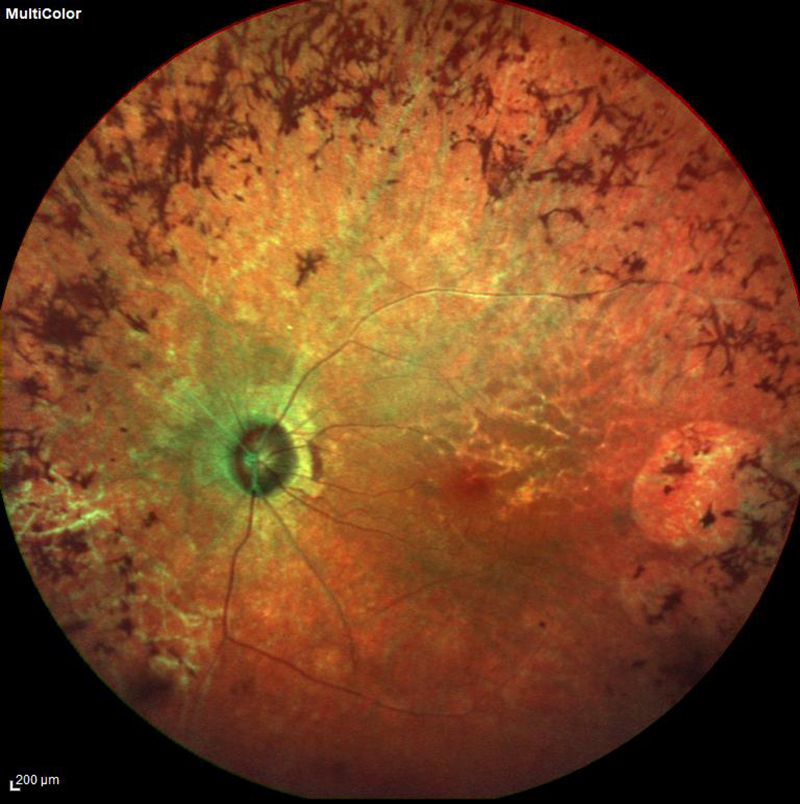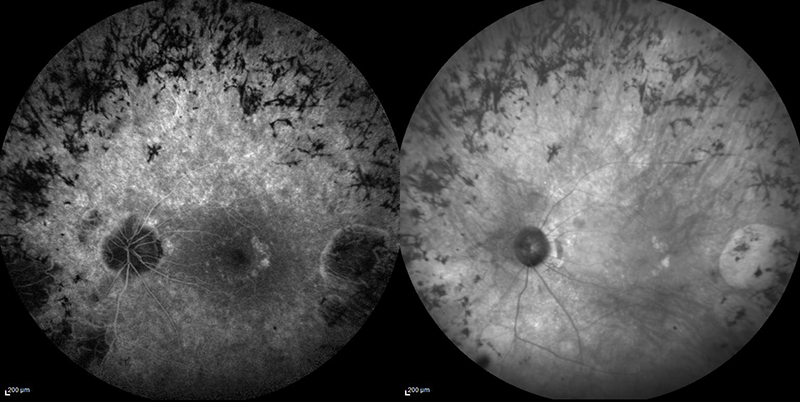Inherited and Genetic Retinal Diseases
 fundus photo of retinitis pigmentosa
fundus photo of retinitis pigmentosa
 fluorescein angiogram and infrared fundus photo of retinitis pigmentosa
fluorescein angiogram and infrared fundus photo of retinitis pigmentosa
What are the inherited and Genetic Retinal Diseases?
Genetic Retinal diseases are disorders due to abnormalities in our DNA, which can be inherited from our parents. Such DNA abnormalities can also develop spontaneously or randomly. When we have abnormal DNA, it causes the production of faulty proteins, leading to structural defects in various parts of our bodies.
What are the Genetic Retinal Diseases?
There is a wide range of different retinal diseases that are due to inherited genetic defects.
Although this list is not all-inclusive, here are some examples of such retinal diseases:
- Achromatopsia
- Bardet Biedl Syndrome
- Bassen-Kornzweig
- Batten disease
- Best Dystrophy
- Choroideremia
- Cone disease
- Cone-Rod disease
- Congenital Stationary night blindness
- Dominant drusen
- Doyne Honeycomb Dystrophy
- Familial Fleck Retina
- Fundus Flavimaculatus
- Goldman-Favre syndrome
- Gyrate Atrophy
- Leber’s Congenital Amaurosis
- Macular degeneration
- North Carolina Macular Dystrophy
- Pattern Dystrophies
- Refsum disease
- Retinitis Pigmentosa (several types)
- Stargardt’s Disease
- Stickler Disease
- Vitelliform Macular Dystrophy
- Wagner Disease
How are the Inherited/Genetic Retinal Diseases Diagnosed?
First, it will be important for you to complete a full history and dilated eye exam in order to diagnose your genetic retinal disease. Depending on what your doctor finds, you may need further testing, such as imaging via Optical Coherence Tomography (OCT), dye studies via fluorescein angiography (FA) and indocyanine green angiography (ICG), visual field testing, color vision testing, plus various others. Sometimes, genetic testing may be used to identify which genes are affected and how. Many retinal diseases can present as part of a syndrome, meaning other parts of your body can be affected, therefore your eye doctor may need to communicate with other physicians regarding your case.
How are the Genetic Retinal Diseases treated?
Depending on what your condition is, treatments can vary. Some genetic retinal diseases are characterized by relatively good, stable vision throughout life. Others tend to produce poor vision and unfortunately, some do not currently have any treatment options. Glasses and special magnifiers can be utilized to optimize the vision. Otherwise, eyedrops, injections, and surgeries are sometimes available as treatment options depending on which specific disease you have. It is important for you to see your retina specialist for regular checkups, to make sure you do not develop any further complications that may result from your condition. For example, patients with Stargardt’s disease, Best’s disease, or pattern dystrophies are known to have in increased risk of developing choroidal neovascularization (the growth of abnormal blood vessels under the retina), while patients with retinitis pigmentosa are monitored for the development of cataracts and macular edema.